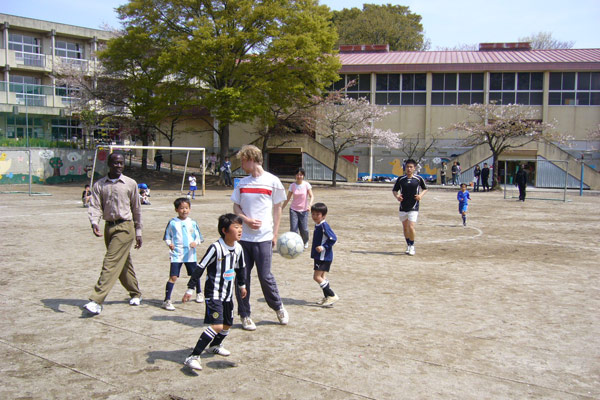
Tell us a little about yourself and why you decided to volunteer with World Campus International in Japan.
Jotter: My name is Jotter Verhaeghe. I’m a 24 year old male from Belgium. I currently live in Fukuoka, Japan and I’m studying a masters in Social studies at Kyushu University. In 2008, (already 4 years ago, gosh), I participated in the spring program of World Campus.
Before I applied to the World Campus program, I was studying Asian cultures and languages at Ghent University, mainly about Japan, but I had never visited the country before. I really wanted to go, but I wanted more than just travel. I looked at some exchange programs, but they were either too expensive or impossible or I didn’t have the right academic background. In the end, I heard about WCI and just seeing their website, I was already sold. They also did a presentation at my University later, but by then I was already in the system and in the pipeline for a program. I raised some funds, managed to get the fees and off I was.
Describe your day to day activities as a volunteer.
Jotter: I’ll write it in a day schedule type shape. The weekly schedule has three types of days: free days on which you can do whatever pleases you, host family days on which your host family takes you somewhere and program days. I’ll write mainly about the program days.
7:00-7:30 Waking up on a futon or in a bed. Either an alarm clock, a host parent calling your name or some excited host family’s kids jumping on top of you and yelling: “wake up sleepy head foreigner.”
7:35: Breakfast: either traditional Japanese with fish and rice and miso soup or sunny side up and some toast or whatever your host family mom thinks you will like.
7:45: Take a quick shower (or bath last night means it is okay to just freshen up at the sink)
7:55: Your host family takes you to the program place, or you are put on a train or a bus hoping you’ll get off at the right place.
8:15-30: The other people gather and we discuss the day’s plan and last night experiences and do some bonding activities.
9:00 Morning activity: this can be either in a group or in small groups and you can choose to practice for an event you will perform at, study about our countries, visit a martial arts Dojo and practice, perform a Japanese tea ceremony, make soba at a shop or visit a museum (peace museum, anthropological museum, …) or a company (beer, noodles, broadcasting,…)

12:30 Lunch: Either with a local community or a lunch box or a cold platter or the program provides funds and tells you where you can find restaurants and you can choose yourself.
13:30 Afternoon activities, such as visiting an elementary school and tell kids about your country and they’ll teach you about their culture, play dodgeball with Japanese children, visiting a Japanese sword smith, visiting a temple or a shrine and talk with a monk or priest, talking with a survivor of the atomic bombing in the second world war, participating in a cultural event and stand on a stage in front of a hundred people *gasp*, doing some activities with elderly or handicapped people, learning more Japanese (or English if you are Japanese), or visiting a Japanese castle or a hospital.
18:30 Picked up by host family or take the train or bus back.
17:00 Dinner with your host family or possible a party with your host family or a barbeque or you’ll go out to eat or you’ll play games until very late or just talk and then it is almost 23:30 before you know it.
22:30 or later: take a bath or shower and/or go to bed. Sleep like an Ox.
How has this experience helped you grow personally and professionally?
Jotter: The program has impacted my future in many ways. As a person, I have grown stronger and have become a leader, who is more extrovert and who isn’t afraid to tackle problems, especially in regard to cultures. As a friend, I have made so many friends all over the world and of course all over Japan. I have visited many of them after the program and a couple also visited my country and stayed at my house. One of the friends who stayed at my house half a year after the program then became my girlfriend and now my fiancée. As an Asian studies scholar: The program gave me the experience and the confidence to get a scholarship and continue my studies in Japan. I didn’t so much study Japanese through the program as I was able to apply the Japanese I had already learned and practice it in diverse environments.